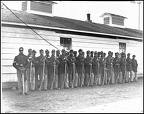By late 1863, the Civil War was over in large parts of what was the Confederacy. The Northern forces
had gained control over the Mississippi River and all of its ports that the South had previously held. The Confederacy lost
the war over slavery in many parts of the South, and slaves fled to find freedom in the Union. Abraham Lincoln was able to
define the Union cause that carried them throughout the war. The Civil War left the Confederacy in a desperate state, while
the Union had gained what they had been hoping for(http://www.bbc.co.uk/dna/h2g2/A3347020).
Union successes in 1863 had a large impact on both the Union and the Confederacy. The North's chances for
victory and reunion of the nation increased. The Northern economy picked up and made up for the loss of Southern markets and
the Mississippi River. Northern agriculture grew during the war due to the replacement of men with machinery. More than 100,000
women took jobs during the Civil War. They were able to perform tasks, that had been previously given to only men, at
lower pay. Women were given the opportunity to help with the war effort, serving as nurses for wounded soldiers.
The Confederacy disintegrated more and more throughout the Civil War. After 1863, defeat affected Southern
politics, destroyed the Southern economy, and invaded the hearts and minds of the Southern people. Defeat plagued the South
in more ways than one. Residents of western Virginia made their own secession movement, and declared themselves for the Union
forming the new state of West Virginia. Other counties considered the same actions. Southerners began to turn against each
other, and against the Confederacy. They refused to join the army, pay taxes, or obey laws prohibiting trade with the enemy.
Defeat came to the South due to their outstanding lack of resources. By 1863, the Confederacy was having a rough time feeding
itself and growing Union control of waterways restricted the distribution of food needed. The shortages became so bad that
people ate rats and mules to survive. Death from starvation occured often and more than one-quarter of Alabama's population
was receiving public welfare by the end of the war.
The number of soldiers gone to war greatly threatened the South. Women and children were left alone to fend
for themselves on plantations, at risk of robbery, and murder. Southerners feared that the slaves left alone on plantations
would rise up against their masters, but slaves were more intent on escape.
The Battle of Antietam had provided Lincoln with the victory he needed to announce the abolition of slavery.
Lincoln himself hated slavery, but had always maintained that preserving the Union was his primary goal in the war. "If I
could save the Union without freeing any slave I would do it, and if I could save it by freeing all the slaves I would do
it; and if I could save it by freeing some and leaving others alone, I would also do that," said Lincoln to a newspaper editor
in August of 1862. Pressure from Northern civilians, Union soldiers, and Congress for some sort of emancipation mounted in
the spring of 1862. In response to the pressure, the Republican Congress prohibited slavery in the territories, and abolished
it in the District of Columbia. Then in July of 1862, Congress passed the Confiscation Act, which ordered the seizure of land
from disloyal Southerners and the emancipation of slaves. Freeing the slaves would appeal to the strong antislavery sentiment
in Britain and gain support for the Union cause. This would weaken the Confederacy's ability to wage war by removing a crucial
source of labor. On September 22, 1862, Lincoln announced his intention to issue the Emancipation Proclamation, which would
take effect January 1, 1863, in all states that were still in rebellion. This proclamation exempted slaves in the border states
loyal to the Union and in any area under Federal occupation. Southerners reacted to the Proclamation with outrage and anger.
They viewed it as an invitation to race war, and feared that freed slaves would kill white women and children while their
husbands were out fighting. Northerners approved the proclamation for the most part. The Emancipation Proclamation was far
more powerful than its words expressed. Lincoln had freed the slaves, and he and the Unon were now bound to the cause of freedom.
Lincoln stated in his December 1862 message to Congress, "In giving freedom to the slave, we assure freedom to the free."
(http://www.pbs.org/wgbh/aia/part4/4h1549.html).
Reconstruction was a difficult time in the South. During the war approximately one in ten Southern men had
been killed. Those who did return from the war found destruction and poverty. The South lost one-fourth of its white
male population between the ages of 20-40. The South also lost two-fifths of its livestock and half its farm machinery. Union
armies destroyed the South's railroads and ruined its industry. Between the years of 1860-1870, the South's wealth declined
by 60 percent, and its share of the nation's wealth dropped from more than 30 percent to 12 percent. The wealth of the North,
however, increased by half in the same period of time. The Civil War did propose two new troubling problems: how to reunite
the South and North and how to deal with slavery.
After the North defeated the South in the Civil War, politicians faced the task of putting the divided country
back together. Due to Lincoln's assassination in 1865, the task of doing this was put on the shoulder's of Andrew Johnson.
The Reconstruction Acts of 1867 laid out the process for readmitting the Southern states to the Union. The Fourteenth Amendment,
passed in 1868, provided slaves with national citizenship, and the Fifteenth Amendment granted black men the right to vote
in 1870. These were only the first steps to fixing the fragmented nation(http://www.history.rochester.edu/class/douglass/part5.html).
When the war ended in 1865, there was no existing plan for reconstructing the Union. Lincoln had outlined
his policy in 1863 when he proposed to readmit a seceding state if 10 percent of its prewar voters took an oath of loyalty
to the Union and it prohibited slavery in a new state constitution. In 1864, a group of Republicans used the Wade-Davis Bill,
which required a majority of a state's prewar voters to pledge their loyalty to the Union and demanded guarantees of black
equality before the law. The bill was passed but Lincoln refused to sign it. President Andrew Johnson, some Republicans, and
most Democrats believed that because the Constitution made no mention of secession, the southern states had been in rebellion,
but had never actually left the Union, so there was no need for a formal process for readmittance.
After the Civil War, the biggest problem across the South was labor. To the African-Americans
who had been held in bondage their entire lives, freedom meant many things. It meant freedom from white control, autonomy
both as individuals and as a community, freedom from the innumerable regulations of slavery, freedom to hold mass meetings
and to worship, freedom to own property, and most importantly, freedom to "have land, and turn it and till it by [their] own
labor." In other words, black people wanted to work for themselves, not for their former masters (http://www.sciway.net/afam/reconstruction/economic.html).
Many blacks chose to leave the South altogether. Not all African Americans were able to acquire their own
land, but some stayed to work on their former plantations. Recently freed slaves faced a lot of adjustment, and many flocked
into Union lines, or followed advancing Union armies. Some slaves left their plantations all together in order to obtain freedom
within the Union lines. Many slaves felt that they would only truly be free if they left their former plantations. To ease
the adjustment of the recently freed slaves, Congress created the Freedman's Bureau in 1865. The Bureau provided food, clothing,
and education, and was to generally look after the interests of those former slaves(http://www.history.rochester.edu/class/douglass/part5.html).
The South suffered devastating losses after the close of the Civil War. The lives of the people changed dramatically.
Before the Civil War, many yeomen had concentrated on raising food crops and instead of cash crops like cotton. After
the war the farmers found themselves deep in debt with their buildings destroyed and their land not tended to. In the early
Reconstruction years, there was a series of crop failures. If the farmers were to resume planting, they would need to borrow
money, bringing them more into debt. This debt only increased with each cotton crop failure (http://www.sciway.net/afam/reconstruction/economic.html).
The Civil War created hope and ultimate success for the Union cause. Along with their victory, the Union's
economic standings were raised, and goals such as Emancipation were reached. Although this is true, the Confederacy's loss
to the Union in the war added many problems to the region. It lost its main labor source, and its value dropped
substantially. People were suffering and the economic effects of the war stayed with the South for decades.








